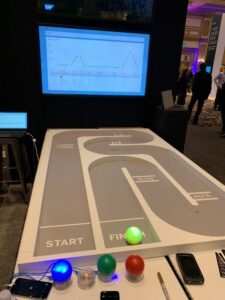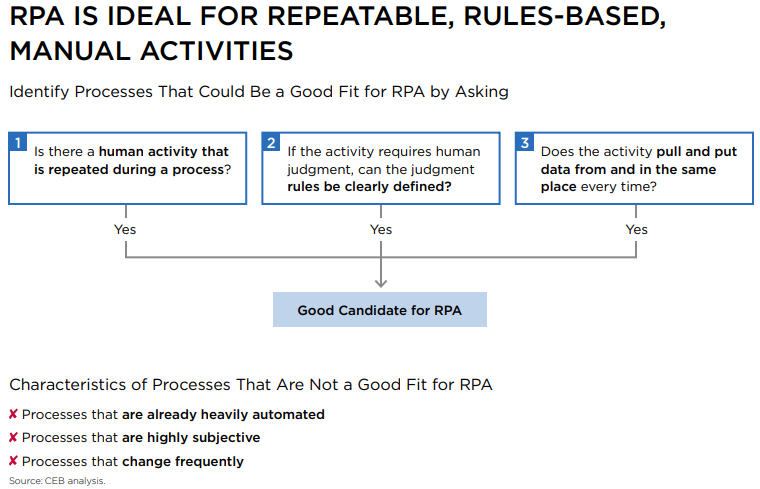The use of new technology continues to be a big focus for Protiviti’s SAP Ecosystem solution in 2020. Artificial Intelligence (AI) and Machine Learning (ML) are poised to help our clients make dramatic shifts in performance, shareholder value and business development over the next several years. The ultimate goal is to eventually get to cognitive automation, where software brings automation to information-intensive processes, but basic process automation can be incorporated by most organizations right now. Many businesses are starting to introduce these basic process automations into their routine tasks in order to cut costs, reduce human error, and gain speed/efficiency. The impact of COVID-19 may speed up this effort as companies look to automation and its associated efficiencies. Tools such as UiPath, Blue Prism, Microsoft Power Automate, or SAP Intelligent Robotic Process Automation using Leonardo can help SAP business users by automating repetitive tasks like extracting data from tables in SAP, or even entering data such as invoices.
I was fortunate to attend the last SAPInsider conference, and participate in many discussions and hands-on labs dealing with Robotic Process Automation (RPA). One of the most entertaining displays at this conference was an interactive demonstration at the SAP booth, which allowed business professionals to take a “driving course.”
This course consisted of a plastic ball that was remote controlled from an iPhone. The user had to navigate through the course without crashing (e.g. hitting the sides of the walls). At the end of the demo, statistics were displayed showing how well the driver performed. Many insurance companies and rental car companies are incorporating this technology into cars by installing sensors. For instance, car insurance premiums or discounts can be determined based on driver performance. The value of a particular rental car can also be determined based on the car’s driving history. This goes to show that RPA technology is all around us, and you might not even know it.
Flash forward a year, and Protiviti now has a client who will be presenting at the upcoming 2020 SAPInsider Conference on how they incorporated RPA technology to assist with validating configuration settings in an SAP S/4HANA environment. During the client’s SAP S/4HANA agile implementation, Protiviti helped identify and document business and IT configurable controls to build a stronger internal control framework. To meet short term requirements, Protiviti assisted with the validation and testing of the SAP configuration settings leveraging our leading class Assure Controls tool. However, it was crucial to identify a long-term solution for 2020 and beyond. Now RPA is used to validate configurable controls for ongoing S/4HANA and Central Finance deployments, in addition to biannual validations.

For SAP users, bots are particularly useful for business automation, security and control automation and audit automation. From a control perspective, a bot can allow an organization to test repetitive and tedious business and IT general controls in an automated fashion. The bot can perform step by step ‘clicks’ in the SAP backend to obtain system configuration settings and analyze the results against defined ‘Gold Standards,’ which reflect the internal control baselines and values. The bot can also compile reporting requirements which outline any differences between SAP and the defined ‘gold standards.’ By doing this, internal control, compliance and audit departments no longer have to spend time drilling down into each individual control.
Although bots will play a significant role for organizations going forward, there are now risks associated with change management and bot access that need to be addressed. A lack of proper access and authentication controls for bots can cause segregation of duties and compliance issues. How can you ensure that the data the bot is extracting is complete and accurate? How can you ensure that there is a proper audit trail? This is why organizations are now starting to include RPA risk into their framework as there is increased audit reliance. An RPA COE team is just one way that clients are managing these new risks.
The newly constructed Protiviti innovation centers (iNN) in New York, London, and Chicago, will allow consultants to work together in an accelerated and targeted effort to deliver new and better solutions using new technologies. These sites are equipped with cutting-edge communication, teaming, and virtual tools to help foster an environment of trying new and different ways to solve both client and internal challenges. Protiviti is also targeting a large increase in the number of employees with UiPath Developer certifications to show our commitment to automation. It will be great to see what other RPA solutions our iNN residents can bring to the table for clients in 2020 and beyond!
Visit Protiviti’s SAP consulting services page for more information on our solutions.





